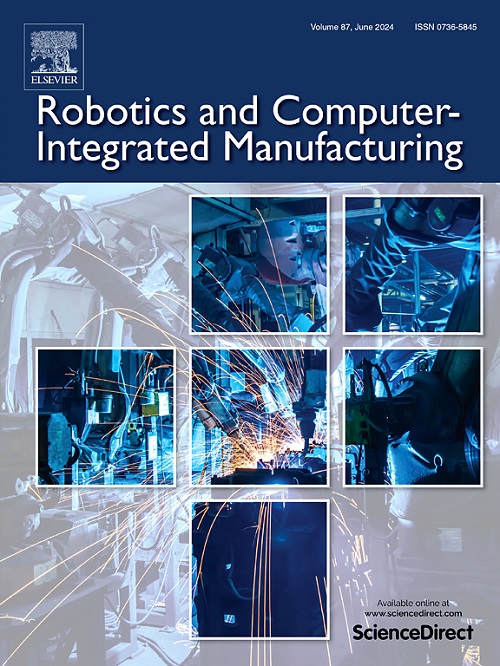Enhancing trajectory tracking accuracy of industrial robots through temporal–spatial mapping and multi-measurement alignment
IF 11.4
1区 计算机科学
Q1 COMPUTER SCIENCE, INTERDISCIPLINARY APPLICATIONS
引用次数: 0
Abstract
Robotic machining and automatic offline programming has been developing rapidly over the last decade, yet the absolute accuracy of industrial robots significantly impacts the processing performance, limiting their application in high-precision manufacturing fields. For dynamic non-contact continuous robotic machining tasks, such as laser cutting, precise trajectory tracking performance is especially critical. In this paper, a parallel tracking error compensation framework is proposed to improve the tracking performance of industrial robots, based on temporal–spatial mapping and multi-measurement alignment (TSM-MMA). Major tracking errors originate from nonlinear motor control lag and non-geometric motion transmission errors. The proposed method incorporates both servomotor encoder feedback and laser tracker measurements, enabling parallel distinction and compensation of these errors across trials. Typical linear and circular trajectories are analyzed using TSM to normalize multi-sensor data. Gaussian process regression (GPR) is employed in the MMA process to model the regularity of repetitive measurements, facilitating targeted error compensation. Physical experiments are conducted with an EFORT ER14-1400 robot and a Leica AT960 laser tracker to validate the effectiveness of the proposed framework.
通过时空映射和多测量对准提高工业机器人轨迹跟踪精度
近十年来,机器人加工和自动离线编程得到了迅速发展,但工业机器人的绝对精度严重影响了加工性能,限制了其在高精度制造领域的应用。对于动态非接触式连续机器人加工任务,如激光切割,精确的轨迹跟踪性能尤为关键。为了提高工业机器人的跟踪性能,提出了一种基于时空映射和多测量对准(TSM-MMA)的并行跟踪误差补偿框架。主要的跟踪误差来源于非线性电机控制滞后和非几何运动传递误差。该方法结合了伺服电机编码器反馈和激光跟踪器测量,实现了这些误差的并行区分和补偿。利用TSM对多传感器数据进行归一化,分析了典型的线性和圆形轨迹。在MMA过程中采用高斯过程回归(GPR)对重复测量的规律性进行建模,便于有针对性地进行误差补偿。利用EFORT ER14-1400机器人和徕卡AT960激光跟踪仪进行了物理实验,验证了所提框架的有效性。
本文章由计算机程序翻译,如有差异,请以英文原文为准。
求助全文
约1分钟内获得全文
求助全文
来源期刊
CiteScore
24.10
自引率
13.50%
发文量
160
审稿时长
50 days
期刊介绍:
The journal, Robotics and Computer-Integrated Manufacturing, focuses on sharing research applications that contribute to the development of new or enhanced robotics, manufacturing technologies, and innovative manufacturing strategies that are relevant to industry. Papers that combine theory and experimental validation are preferred, while review papers on current robotics and manufacturing issues are also considered. However, papers on traditional machining processes, modeling and simulation, supply chain management, and resource optimization are generally not within the scope of the journal, as there are more appropriate journals for these topics. Similarly, papers that are overly theoretical or mathematical will be directed to other suitable journals. The journal welcomes original papers in areas such as industrial robotics, human-robot collaboration in manufacturing, cloud-based manufacturing, cyber-physical production systems, big data analytics in manufacturing, smart mechatronics, machine learning, adaptive and sustainable manufacturing, and other fields involving unique manufacturing technologies.

 求助内容:
求助内容: 应助结果提醒方式:
应助结果提醒方式:


